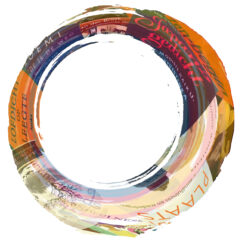Prof. dr. Ton Lathouwers (1932-2024) studeerde wis- en natuurkunde, en Slavische talen en letterkunde. Hierna volgde hij gedurende vier jaar een studie vergelijkende cultuur- en godsdienstwetenschappen over de ontmoeting tussen Oost en West. In 1968 werd Ton Lathouwers benoemd tot gewoon hoogleraar Russische letterkunde te Leuven, met een nevenopdracht aan de theologische faculteit: religieuze thematiek in de moderne literatuur. In 1987 verkreeg Ton Lathouwers zijn officiële autorisatie (transmissie) als leraar Chinese Rinzai Chan van de Chinese Ch’anmeester Teh Cheng. Sindsdien begeleidt hij zengroepen in Nederland, België en Zweden.
Ton Lathouwers was één van de meest liberale zenleraren in het Nederlandse taalgebied. Als docent en hoogleraar in Leuven (Slavische letterkunde) getuigden zijn colleges al vroeg van het appél van hart tot hart. Kort na zijn benoeming tot hoogleraar in 1968 begaf hij zich op de zenweg. Hij bereisde onder andere Japan, Thailand, Birma en ook Indonesië. Daar legde hij zich toe op de studie van het Chinese Rinzai (Lin Chi)-ch’an traditie onder leiding van ch’an-meester Teh Cheng (S.A. Jinarakkhita), die Ton in 1987 transmissie als zenmeester verleende. Bij die gelegenheid werd hem de naam Hui Yu toegekend, wat ‘vriend van wijsheid’ betekent. – Maha Karuna Ch’an
The Dutch Zen-master Ton Lathouwers (1932-2024) studied astronomy, mathematics and physics at the University of Amsterdam (1951-1955) and Russian language and literature (1954-1958), at the same university. From 1958 to 1962, he accomplished his post graduate study of comparative cultural psychology and psychology of religion and obtained Doctorate of Russian symbolism from the University of Nijmegen.
Ton Lathouwers began to study Buddhism since 1968. In 1971 he travelled to Japan for the first time, and he studied there for four months with the famous Zen-philosopher and Zen-scholar Masao Abe, who is the successor of Hisamatsu (1889-1980) and the founder of the FAS-Society. The Zen-movement in Japan was dedicated to breaking through the social and class divisions and the organizations of Japanese Zen.The word FAS is an initialism of the wordsFormless-self, All-human kindandSupra-historical. At the same time, Ton Lathouwers practiced and studied Zen-Buddhism in Kyoto at the Daitoku-ji Rinzai Zen monastery with Zen-master NanreiKobori.The following four years he kept to study there. In 1975 Ton became a student of Chan-master Teh Cheng in Indonesia. In the Chinese Zen-Buddhism of Teh Cheng, with the particular emphasis on the Avatamsaka sutra, our task to save all beings without exeption, and the boundless compassion of Quan Yin, he discovered what should remain for him the most important part of his life.
From 1971 to 1987,Ton had conducted three-month studies for each year in Buddhist monasteries in Japan, Hong Kong, Singapore, Thailand, Korea, Indonesia and the United States. In 1987 he received the official authorization/transmission as Chan-master in Chinese Linji Chan Buddhism from Teh Cheng, who was the coordinator and head of the Sangha Agung Indonesia until his death in 2002. This organisation brought together all Buddhist schools in Indonesia.Teh Cheng was better known under his Pali name in Indonesia: Ashin Jinarakkhita. He received his own transmission from Pen Cheng of the Guang Hua Chan-monastery in Fujian, China.
Starting from 1987, Ton founded 27 Chan meditation centres in Belgium, the Netherlands and England. All these groups were brought together in the Maha Karuna Chan sangha.The focus of his teaching was primarily on the inner conversion of once heart-mind, in Buddhist language is Ashraya-Paravritti, which is beautifully translated in English as revolution of the fundaments. Beside this, his teaching had emphasized the interconnectedness of all things, Pratityasamutpada was expressed in Buddhist language, and it was translated into creative interdependent coorigination in English literally. Deepening our awareness of this interconnectedness: the very fact is we live together with all living beings form the pulsing, boundless Web of Indra, allows us to live a life of ongoing dialogue, mutual understanding and compassion. – monastery of longquan

